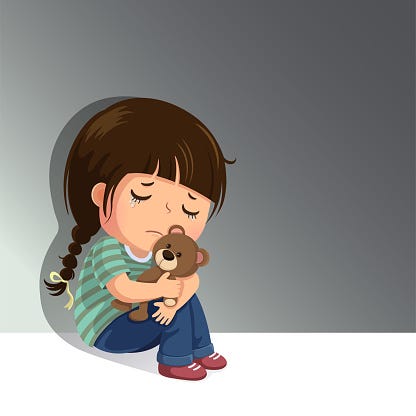Dear Reader, Before you start reading today’s article, I have some great news to share with you. I started this blog in June 2020 to raise awareness about social-emotional learning. I am feeling overjoyed as I share, that one of India’s leading e-papers wrote an article about my work.You can read the article here. Thank you for motivating me and being a part of my journey. 13-year-old Antara is scribbling in her notebook. She is constantly writing Nobody loves me. I hate myself.
Is what Antara thinking, true?
Maybe. Maybe not. Antara is feeling lonely and sad right now. There might be a lot of people in her life who love her, but perhaps they are not being able to communicate it to her.
But, what’s the need to communicate? Aren’t actions enough?
Antara probably knows that her parents love her. They might be her safe space too. But sometimes, just a small verbal reminder that "Hey, I love you and I'm here for you" can mean the world to children. Sometimes love needs to be explicitly expressed in words and not just actions. This increases trust and creates a sense of belonging. It tells a child that no matter what, I always have someone who is there for me.
So, How do we appreciate children explicitly?
1. Tell them you love them- Sometimes children know that you love them, but it needs to be communicated in words too. Hug them and tell them you love them. Tell them how proud you are of them and how much they mean to you. This makes them feel safe, appreciated, and heard.
2. Compliment their efforts- If they show you a painting or a new skill they've learned. Instead of saying oh, wow that's great. Talk about what in specific you liked. This tells them that, you are actually interested in their efforts and are giving them attention.
3. Encourage ideas- Take their opinion when you are making decisions. Even if their idea isn't convincing, ask them "How can we make this work?" Encourage them to think more and thank them for their contribution and efforts.
4. Self-appreciation- Encourage them to appreciate themselves as well. At the end of the day ask them "What is something they are proud of?" or "What makes you amazing?". If there a time where a child says they can't think of anything ask them, "What is something you want to do tomorrow that will make you proud?". This makes them independent and not look for external validation as adults.
5. Listen to them - One of the most underrated ways to appreciate is to listen. When you listen you non-verbally tell them that "I hear you. Your opinion matters to me." This itself means the world to children and initiates a sense of belonging in them.
Remember, every person wants to feel appreciated and loved. If we want children to appreciate others, let's start by appreciating them in the first place.










Lovely